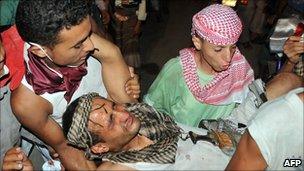Yemen forces 'kill 20 protesters' in Taiz
- Published

Security forces in Yemen have shot dead at least 20 anti-government protesters in the southern city of Taiz, medics and organisers say.
Soldiers reportedly moved in to end a four-month-old sit-in in the city.
Meanwhile, Yemen's air force has bombed suspected al-Qaeda fighters who have seized the southern town of Zinjibar, witnesses said.
President Ali Abdullah Saleh refuses to step down despite months of protests and strong opposition from a key tribe.
Taiz was one of the first cities in Yemen where demonstrators - inspired by popular uprisings in Tunisia and Egypt - chose to gather.
A doctor in the city, Abdulkadir al-Gunaid, told the BBC that security forces were erasing all traces of the protests in Freedom Square.
"They attacked, shot at people, burned their tents. The square had a big stage to make speeches and to make plays and songs, loudspeakers and this sort of thing.
"They killed them [protesters]... and at 0300 [0100 GMT], they brought bulldozers and finished it all. There is nothing there. They are even cleaning it so no-one can guess that there was anything like that before."
Activist Bushra al-Maqtari told AFP news agency: "This was a massacre. They have dragged the wounded off to detention centres from the streets."
Another medical source said some of the wounded had been run over by bulldozers.
Earlier reports quoting witnesses and doctors said security forces attacked protesters with rifles and water cannon and set fire to their camp.
Sadek al-Shugaa, head of a field hospital at the camp, was quoted by AP news agency as saying soldiers fired into the crowds indiscriminately.
The opposition coalition Common Forum condemned the "crimes against humanity" committed by President Saleh's "remaining military and security forces and armed militias".
It warned the Yemeni leader he would be "held personally responsible for his continued crimes against the people".
"These crimes do not get forgotten with time," the forum said in a statement.
"They are being monitored and documented, and those who have committed them, and who provided arms and money, will not escape justice."
In the capital Sanaa, activists said they were clearing the protest camp of any weapons in an attempt to assert the peaceful credentials of the anti-government campaign. Demonstrations there continued on Monday.
Zinjibar 'air strikes'
Meanwhile, witnesses in Zinjibar said Yemeni jets had bombed positions of Islamist militants around the town on Monday.
The BBC's Lina Sinjab said protesters in Sanaa staged a "march of mourning"
One report said the army was also shelling the town with artillery.
Resident Ali Dahmas told the AP news agency by telephone that fighter jets were firing at the southern outskirts of the town.
Tareq al-Fadhli, a leading tribal figure in Zinjibar, described the situation in the town as "catastrophic".
Corpses littered the streets, water and electricity had been cut off, hospitals were no longer functioning and many residents had fled, he told AFP by telephone.
He said the gunmen claimed to be part of a group called the Partisans of Sharia (Islamic law). He estimated their number at about 1,000.
Earlier, security officials said four soldiers were killed when their convoy was ambushed near Zinjibar.
"A convoy of reinforcements fell in an ambush by al-Qaeda elements 1km [less than a mile] from Zinjibar. Four soldiers, including a colonel, were killed and a number of others were wounded," the security official said.
Government reports from Zinjibar suggested the town had been seized some days ago by gunmen from al-Qaeda in the Arabian Peninsula (AQAP).
A battle has reportedly been going on as forces loyal to President Saleh try to take it back.
However, there are conflicting accounts of the loyalties of the armed men.
The government has blamed previous attacks in southern Yemen on al-Qaeda, but the country's opposition has accused President Saleh of stoking fears of an Islamist takeover.
The opposition coalition Common Forum said Mr Saleh had "delivered Zinjibar to groups that he has formed and armed, to continue to utilise the spectre of al-Qaeda to frighten regional and international parties".
Army officers who have defected to the opposition say President Saleh is trying to create chaos in the country.
On Sunday, President Saleh and the country's most powerful tribal leader agreed a ceasefire after five days of fighting in the capital Sanaa, a mediator said.
More than 100 people have died in clashes between forces loyal to Hashid leader Sheikh Sadiq al-Ahmar and President Saleh.
The fighting had threatened to push Yemen into civil war.